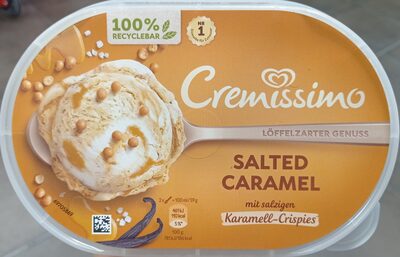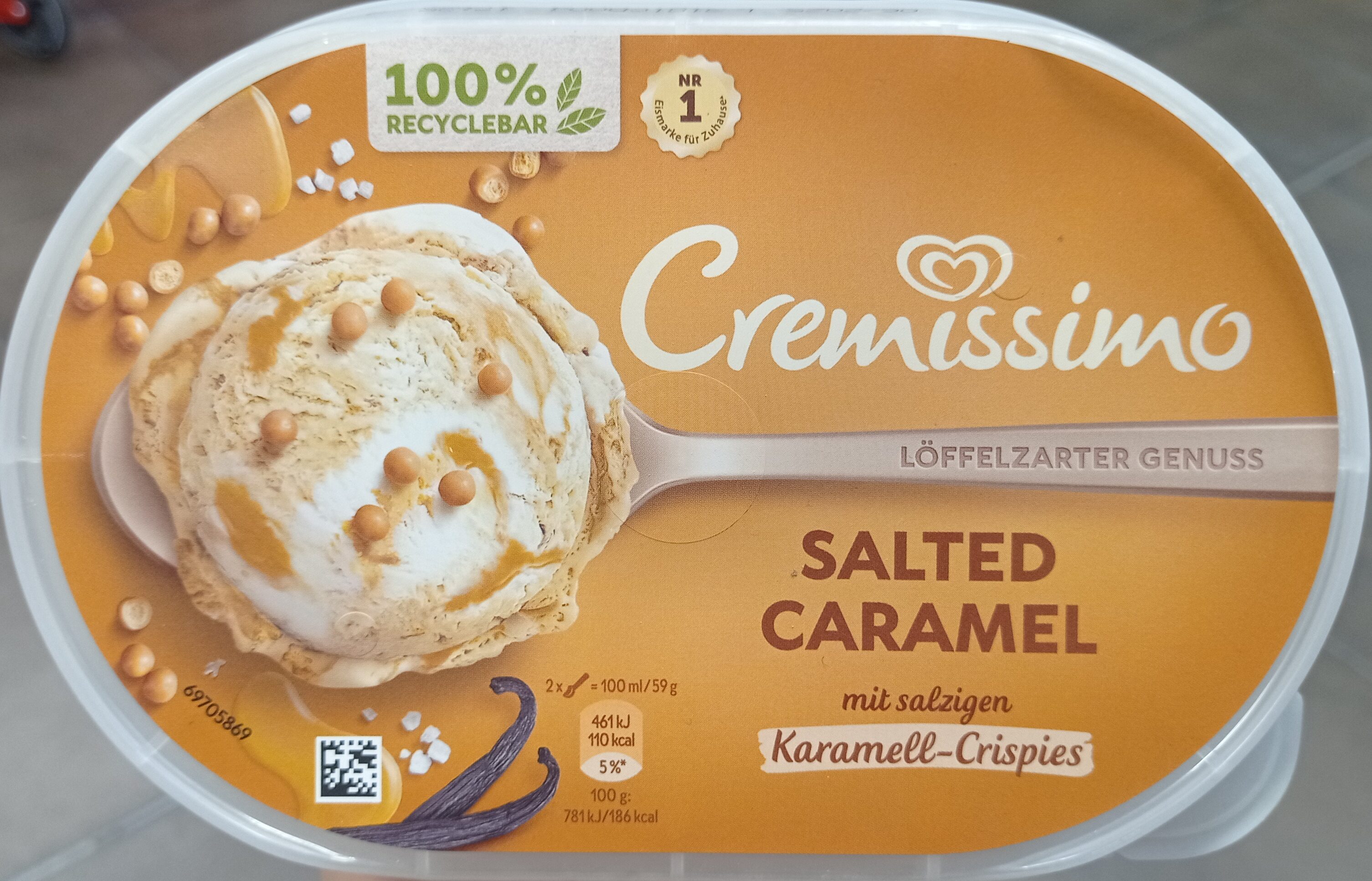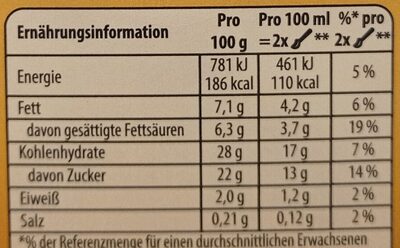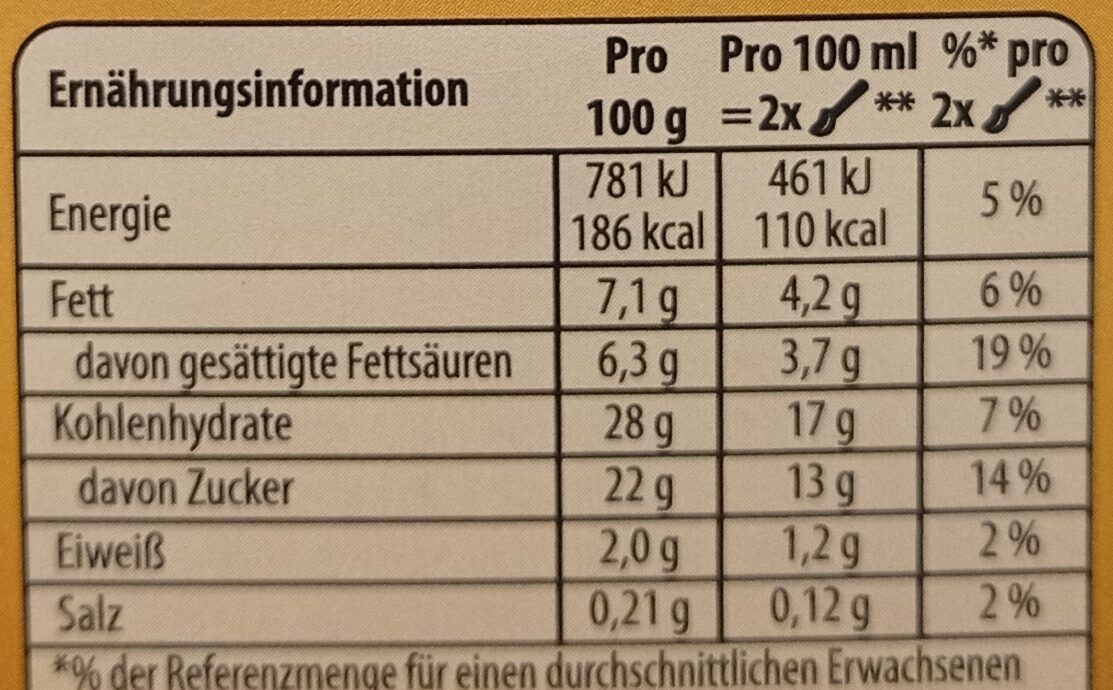Help us make food transparency the norm!
As a non-profit organization, we depend on your donations to continue informing consumers around the world about what they eat.
The food revolution starts with you!
Salted Caramel - Cremissimo - 536 g / 900 ml
Salted Caramel - Cremissimo - 536 g / 900 ml
This product page is not complete. You can help to complete it by editing it and adding more data from the photos we have, or by taking more photos using the app for Android or iPhone/iPad. Thank you!
×
Barcode: 8711327481565 (EAN / EAN-13)
Common name: Karamelleis und Vanilleeis mit gesalzener Karamellsauce (19%) und gesalzene Karamell-Gebäck-Crispies (1,5%).
Quantity: 536 g / 900 ml
Brands: Cremissimo, Langnese, Unilever
Categories: Desserts, Frozen foods, Frozen desserts, Ice creams and sorbets, Ice creams, Ice cream tubs
Stores: Rewe
Countries where sold: Germany
Matching with your preferences
Health
Ingredients
-
34 ingredients
German: entrahmte MILCH, Wasser, Zucker, Glukosesirup, Kokosfett, Glukose-Fruktose-Sirup, Karamellzuckersirup (4%), Fruktose, MOLKENERZEUGNIS, Kakaobutter, Stabilisatoren (Johannisbrotkernmehl, Guarkernmehl, Gummi arabicum, Carrageen), Emulgatoren (Mono - und Diglyceride von Speisefettsäuren, Lecithine), VOLLMILCHPULVER, WEIZENMEHL, MAGERMILCHPULVER, Karamellpulver (0,1%), Salz (0,1%), Aromen, HAFERMEHL, WEIZENMALZMEHL, natürliches Vanillearoma, Backtriebmittel (Natriumcarbonate), Kakaomasse. Kann andere glutenhaltige Getreide, Ei, Soja und Nüsse enthalten.Allergens: Gluten, MilkTraces: Eggs, Gluten, Nuts, Soybeans
Food processing
-
Ultra processed foods
Elements that indicate the product is in the 4 - Ultra processed food and drink products group:
- Additive: E322 - Lecithins
- Additive: E407 - Carrageenan
- Additive: E412 - Guar gum
- Additive: E414 - Acacia gum
- Additive: E471 - Mono- and diglycerides of fatty acids
- Ingredient: Emulsifier
- Ingredient: Flavouring
- Ingredient: Glucose
- Ingredient: Glucose syrup
- Ingredient: Whey
Food products are classified into 4 groups according to their degree of processing:
- Unprocessed or minimally processed foods
- Processed culinary ingredients
- Processed foods
- Ultra processed foods
The determination of the group is based on the category of the product and on the ingredients it contains.
Additives
-
E322 - Lecithins
Lecithins are natural compounds commonly used in the food industry as emulsifiers and stabilizers.
Extracted from sources like soybeans and eggs, lecithins consist of phospholipids that enhance the mixing of oil and water, ensuring smooth textures in various products like chocolates, dressings, and baked goods.
They do not present any known health risks.
-
E407 - Carrageenan
Carrageenan (E407), derived from red seaweed, is widely employed in the food industry as a gelling, thickening, and stabilizing agent, notably in dairy and meat products.
It can exist in various forms, each imparting distinct textural properties to food.
However, its degraded form, often referred to as poligeenan, has raised health concerns due to its potential inflammatory effects and its classification as a possible human carcinogen (Group 2B) by the International Agency for Research on Cancer (IARC).
Nevertheless, food-grade carrageenan has been deemed safe by various regulatory bodies when consumed in amounts typically found in food.
-
E412 - Guar gum
Guar gum (E412) is a natural food additive derived from guar beans.
This white, odorless powder is valued for its remarkable thickening and stabilizing properties, making it a common ingredient in various food products, including sauces, dressings, and ice creams.
When used in moderation, guar gum is considered safe for consumption, with no known adverse health effects.
-
E414 - Acacia gum
Gum arabic: Gum arabic, also known as acacia gum, arabic gum, gum acacia, acacia, Senegal gum and Indian gum, and by other names, is a natural gum consisting of the hardened sap of various species of the acacia tree. Originally, gum arabic was collected from Acacia nilotica which was called the "gum arabic tree"; in the present day, gum arabic is collected from acacia species, predominantly Acacia senegal and Vachellia -Acacia- seyal; the term "gum arabic" does not indicate a particular botanical source. In a few cases so‐called "gum arabic" may not even have been collected from Acacia species, but may originate from Combretum, Albizia or some other genus. Producers harvest the gum commercially from wild trees, mostly in Sudan -80%- and throughout the Sahel, from Senegal to Somalia—though it is historically cultivated in Arabia and West Asia. Gum arabic is a complex mixture of glycoproteins and polysaccharides. It is the original source of the sugars arabinose and ribose, both of which were first discovered and isolated from it, and are named after it. Gum arabic is soluble in water. It is edible, and used primarily in the food industry as a stabilizer, with EU E number E414. Gum arabic is a key ingredient in traditional lithography and is used in printing, paint production, glue, cosmetics and various industrial applications, including viscosity control in inks and in textile industries, though less expensive materials compete with it for many of these roles. While gum arabic is now produced throughout the African Sahel, it is still harvested and used in the Middle East.Source: Wikipedia
-
E471 - Mono- and diglycerides of fatty acids
Mono- and diglycerides of fatty acids (E471), are food additives commonly used as emulsifiers in various processed foods.
These compounds consist of glycerol molecules linked to one or two fatty acid chains, which help stabilize and blend water and oil-based ingredients. E471 enhances the texture and shelf life of products like margarine, baked goods, and ice cream, ensuring a smooth and consistent texture.
It is generally considered safe for consumption within established regulatory limits.
-
E500 - Sodium carbonates
Sodium carbonates (E500) are compounds commonly used in food preparation as leavening agents, helping baked goods rise by releasing carbon dioxide when they interact with acids.
Often found in baking soda, they regulate the pH of food, preventing it from becoming too acidic or too alkaline. In the culinary world, sodium carbonates can also enhance the texture and structure of foods, such as noodles, by modifying the gluten network.
Generally recognized as safe, sodium carbonates are non-toxic when consumed in typical amounts found in food.
Ingredients analysis
-
May contain palm oil
Ingredients that may contain palm oil: E471
-
Non-vegan
Non-vegan ingredients: Skimmed milk, Whey product, Whole milk powder, Skimmed milk powder, EggSome ingredients could not be recognized.
We need your help!
You can help us recognize more ingredients and better analyze the list of ingredients for this product and others:
- Edit this product page to correct spelling mistakes in the ingredients list, and/or to remove ingredients in other languages and sentences that are not related to the ingredients.
- Add new entries, synonyms or translations to our multilingual lists of ingredients, ingredient processing methods, and labels.
If you would like to help, join the #ingredients channel on our Slack discussion space and/or learn about ingredients analysis on our wiki. Thank you!
-
Vegetarian status unknown
Unrecognized ingredients: de:kann-andere-glutenhaltige-getreideSome ingredients could not be recognized.
We need your help!
You can help us recognize more ingredients and better analyze the list of ingredients for this product and others:
- Edit this product page to correct spelling mistakes in the ingredients list, and/or to remove ingredients in other languages and sentences that are not related to the ingredients.
- Add new entries, synonyms or translations to our multilingual lists of ingredients, ingredient processing methods, and labels.
If you would like to help, join the #ingredients channel on our Slack discussion space and/or learn about ingredients analysis on our wiki. Thank you!
-
Details of the analysis of the ingredients
We need your help!
Some ingredients could not be recognized.
We need your help!
You can help us recognize more ingredients and better analyze the list of ingredients for this product and others:
- Edit this product page to correct spelling mistakes in the ingredients list, and/or to remove ingredients in other languages and sentences that are not related to the ingredients.
- Add new entries, synonyms or translations to our multilingual lists of ingredients, ingredient processing methods, and labels.
If you would like to help, join the #ingredients channel on our Slack discussion space and/or learn about ingredients analysis on our wiki. Thank you!
de: entrahmte MILCH, Wasser, Zucker, Glukosesirup, Kokosfett, Glukose-Fruktose-Sirup, Karamellzuckersirup 4%, Fruktose, MOLKENERZEUGNIS, Kakaobutter, Stabilisatoren (Johannisbrotkernmehl, Guarkernmehl, Gummi arabicum, Carrageen), Emulgatoren (mono- und Diglyceride von Speisefettsäuren, Lecithine), VOLLMILCHPULVER, WEIZENMEHL, MAGERMILCHPULVER, Karamellpulver 0.1%, Salz 0.1%, Aromen, HAFERMEHL, WEIZENMALZMEHL, natürliches Vanillearoma, Backtriebmittel (Natriumcarbonate), Kakaomasse, Kann andere glutenhaltige Getreide, Ei, Soja, Nüsse enthalten- entrahmte MILCH -> en:skimmed-milk - vegan: no - vegetarian: yes - ciqual_proxy_food_code: 19051 - percent_min: 4 - percent_max: 75
- Wasser -> en:water - vegan: yes - vegetarian: yes - ciqual_food_code: 18066 - percent_min: 4 - percent_max: 39.5
- Zucker -> en:sugar - vegan: yes - vegetarian: yes - ciqual_proxy_food_code: 31016 - percent_min: 4 - percent_max: 22
- Glukosesirup -> en:glucose-syrup - vegan: yes - vegetarian: yes - ciqual_proxy_food_code: 31016 - percent_min: 4 - percent_max: 21.75
- Kokosfett -> en:coconut-fat - vegan: yes - vegetarian: yes - from_palm_oil: no - ciqual_food_code: 16040 - percent_min: 4 - percent_max: 18.2
- Glukose-Fruktose-Sirup -> en:glucose-fructose-syrup - vegan: yes - vegetarian: yes - ciqual_food_code: 31077 - percent_min: 4 - percent_max: 15.8333333333333
- Karamellzuckersirup -> en:caramelised-sugar-syrup - vegan: yes - vegetarian: yes - ciqual_proxy_food_code: 31016 - percent_min: 4 - percent: 4 - percent_max: 4
- Fruktose -> en:fructose - vegan: yes - vegetarian: yes - ciqual_food_code: 31077 - percent_min: 0.1 - percent_max: 4
- MOLKENERZEUGNIS -> en:whey-product - vegan: no - vegetarian: maybe - percent_min: 0.1 - percent_max: 4
- Kakaobutter -> en:cocoa-butter - vegan: yes - vegetarian: yes - ciqual_food_code: 16030 - percent_min: 0.1 - percent_max: 4
- Stabilisatoren -> en:stabiliser - percent_min: 0.1 - percent_max: 4
- Johannisbrotkernmehl -> en:carob-seed-flour - vegan: yes - vegetarian: yes - ciqual_proxy_food_code: 9410 - percent_min: 0 - percent_max: 4
- Guarkernmehl -> en:e412 - vegan: yes - vegetarian: yes - percent_min: 0 - percent_max: 2
- Gummi arabicum -> en:e414 - vegan: yes - vegetarian: yes - percent_min: 0 - percent_max: 1.33333333333333
- Carrageen -> en:e407 - vegan: yes - vegetarian: yes - percent_min: 0 - percent_max: 1
- Emulgatoren -> en:emulsifier - percent_min: 0.1 - percent_max: 4
- mono- und Diglyceride von Speisefettsäuren -> en:e471 - vegan: maybe - vegetarian: maybe - from_palm_oil: maybe - percent_min: 0 - percent_max: 4
- Lecithine -> en:e322 - vegan: maybe - vegetarian: maybe - percent_min: 0 - percent_max: 2
- VOLLMILCHPULVER -> en:whole-milk-powder - vegan: no - vegetarian: yes - ciqual_food_code: 19021 - percent_min: 0.1 - percent_max: 4
- WEIZENMEHL -> en:wheat-flour - vegan: yes - vegetarian: yes - ciqual_proxy_food_code: 9410 - percent_min: 0.1 - percent_max: 4
- MAGERMILCHPULVER -> en:skimmed-milk-powder - vegan: no - vegetarian: yes - ciqual_food_code: 19054 - percent_min: 0.1 - percent_max: 4
- Karamellpulver -> en:caramel-powder - vegan: yes - vegetarian: yes - percent_min: 0.1 - percent: 0.1 - percent_max: 0.1
- Salz -> en:salt - vegan: yes - vegetarian: yes - ciqual_food_code: 11058 - percent_min: 0.1 - percent: 0.1 - percent_max: 0.1
- Aromen -> en:flavouring - vegan: maybe - vegetarian: maybe - percent_min: 0 - percent_max: 0.1
- HAFERMEHL -> en:oat-flour - vegan: yes - vegetarian: yes - ciqual_food_code: 9310 - percent_min: 0 - percent_max: 0.1
- WEIZENMALZMEHL -> en:malted-wheat-flour - vegan: yes - vegetarian: yes - ciqual_proxy_food_code: 9410 - percent_min: 0 - percent_max: 0.1
- natürliches Vanillearoma -> en:natural-vanilla-flavouring - vegan: yes - vegetarian: yes - percent_min: 0 - percent_max: 0.1
- Backtriebmittel -> en:raising-agent - percent_min: 0 - percent_max: 0.1
- Natriumcarbonate -> en:e500 - vegan: yes - vegetarian: yes - percent_min: 0 - percent_max: 0.1
- Kakaomasse -> en:cocoa-paste - vegan: yes - vegetarian: yes - ciqual_proxy_food_code: 16030 - percent_min: 0 - percent_max: 0.1
- Kann andere glutenhaltige Getreide -> de:kann-andere-glutenhaltige-getreide - percent_min: 0 - percent_max: 0.1
- Ei -> en:egg - vegan: no - vegetarian: yes - ciqual_food_code: 22000 - percent_min: 0 - percent_max: 0.1
- Soja -> en:soya - vegan: yes - vegetarian: yes - percent_min: 0 - percent_max: 0.1
- Nüsse enthalten -> en:nut - vegan: yes - vegetarian: yes - percent_min: 0 - percent_max: 0.1
Nutrition
-
Poor nutritional quality
⚠ ️Warning: the amount of fiber is not specified, their possible positive contribution to the grade could not be taken into account.⚠ ️Warning: the amount of fruits, vegetables and nuts is not specified on the label, it was estimated from the list of ingredients: 0This product is not considered a beverage for the calculation of the Nutri-Score.
Positive points: 0
- Proteins: 1 / 5 (value: 2, rounded value: 2)
- Fiber: 0 / 5 (value: 0, rounded value: 0)
- Fruits, vegetables, nuts, and colza/walnut/olive oils: 0 / 5 (value: 0, rounded value: 0)
Negative points: 12
- Energy: 2 / 10 (value: 778, rounded value: 778)
- Sugars: 4 / 10 (value: 22, rounded value: 22)
- Saturated fat: 6 / 10 (value: 6.3, rounded value: 6.3)
- Sodium: 0 / 10 (value: 84, rounded value: 84)
The points for proteins are not counted because the negative points are greater or equal to 11.
Nutritional score: (12 - 0)
Nutri-Score:
-
Nutrient levels
-
Fat in moderate quantity (7.1%)
What you need to know- A high consumption of fat, especially saturated fats, can raise cholesterol, which increases the risk of heart diseases.
Recommendation: Limit the consumption of fat and saturated fat- Choose products with lower fat and saturated fat content.
-
Saturated fat in high quantity (6.3%)
What you need to know- A high consumption of fat, especially saturated fats, can raise cholesterol, which increases the risk of heart diseases.
Recommendation: Limit the consumption of fat and saturated fat- Choose products with lower fat and saturated fat content.
-
Sugars in high quantity (22%)
What you need to know- A high consumption of sugar can cause weight gain and tooth decay. It also augments the risk of type 2 diabetes and cardio-vascular diseases.
Recommendation: Limit the consumption of sugar and sugary drinks- Sugary drinks (such as sodas, fruit beverages, and fruit juices and nectars) should be limited as much as possible (no more than 1 glass a day).
- Choose products with lower sugar content and reduce the consumption of products with added sugars.
-
Salt in low quantity (0.21%)
What you need to know- A high consumption of salt (or sodium) can cause raised blood pressure, which can increase the risk of heart disease and stroke.
- Many people who have high blood pressure do not know it, as there are often no symptoms.
- Most people consume too much salt (on average 9 to 12 grams per day), around twice the recommended maximum level of intake.
Recommendation: Limit the consumption of salt and salted food- Reduce the quantity of salt used when cooking, and don't salt again at the table.
- Limit the consumption of salty snacks and choose products with lower salt content.
-
-
Nutrition facts
Nutrition facts As sold
for 100 g / 100 mlCompared to: Ice cream tubs Energy 778 kj
(186 kcal)-11% Fat 7.1 g -30% Saturated fat 6.3 g -1% Carbohydrates 28 g +10% Sugars 22 g +1% Fiber ? Proteins 2 g -40% Salt 0.21 g +36% Fruits‚ vegetables‚ nuts and rapeseed‚ walnut and olive oils (estimate from ingredients list analysis) 0 %
Environment
-
Eco-Score B - Low environmental impact
⚠ ️Select a country in order to include the full impact of transportation.The Eco-Score is an experimental score that summarizes the environmental impacts of food products.→ The Eco-Score was initially developped for France and it is being extended to other European countries. The Eco-Score formula is subject to change as it is regularly improved to make it more precise and better suited to each country.Life cycle analysis
-
Average impact of products of the same category: A (Score: 87/100)
Category: Ice cream, cone (normal size)
Category: Ice cream, cone (normal size)
- PEF environmental score: 0.22 (the lower the score, the lower the impact)
- including impact on climate change: 1.74 kg CO2 eq/kg of product
Stage Impact Agriculture
56.4 %Processing
18.3 %Packaging
6.8 %Transportation
7.0 %Distribution
7.3 %Consumption
4.2 %
Bonuses and maluses
-
Missing origins of ingredients information
Malus: -5
⚠ ️ The origins of the ingredients of this product are not indicated.
If they are indicated on the packaging, you can modify the product sheet and add them.
If you are the manufacturer of this product, you can send us the information with our free platform for producers.
-
Packaging with a medium impact
Malus: -11
Shape Material Recycling Impact 1 Box PP 5 - Polypropylene High 1 Lid Plastic High 1 Seal Plastic High
Eco-Score for this product
-
Impact for this product: B (Score: 71/100)
Product: Salted Caramel - Cremissimo - 536 g / 900 ml
Life cycle analysis score: 87
Sum of bonuses and maluses: -16
Final score: 71/100
-
Carbon footprint
-
Equal to driving 0.9 km in a petrol car
174 g CO² per 100g of product
The carbon emission figure comes from ADEME's Agribalyse database, for the category: Ice cream, cone (normal size) (Source: ADEME Agribalyse Database)
Stage Impact Agriculture
60.7 %Processing
12.4 %Packaging
10.4 %Transportation
11.3 %Distribution
3.8 %Consumption
1.5 %
Packaging
-
Packaging with a medium impact
-
Packaging parts
1 x Box (PP 5 - Polypropylene)
1 x Lid (Plastic)
1 x Seal (Plastic)
-
Packaging materials
Material % Packaging weight Packaging weight per 100 g of product Plastic
-
Transportation
-
Origins of ingredients
Missing origins of ingredients information
⚠ ️ The origins of the ingredients of this product are not indicated.
If they are indicated on the packaging, you can modify the product sheet and add them.
If you are the manufacturer of this product, you can send us the information with our free platform for producers.Add the origins of ingredients for this product Add the origins of ingredients for this product
Report a problem
-
Incomplete or incorrect information?
Category, labels, ingredients, allergens, nutritional information, photos etc.
If the information does not match the information on the packaging, please complete or correct it. Open Food Facts is a collaborative database, and every contribution is useful for all.
Data sources
Product added on by openfoodfacts-contributors
Last edit of product page on by moon-rabbit.
Product page also edited by bartolomeu, halal-app-chakib, insectproductadd, kiliweb, prepperapp, rochus, yuka.sY2b0xO6T85zoF3NwEKvlkt3dsjnvCmeFCzmtnaE1O3WN8CyWulfxpL7Yqo.
Last check of product page on by moon-rabbit.











